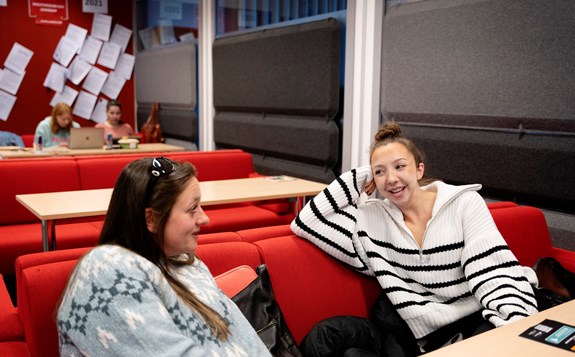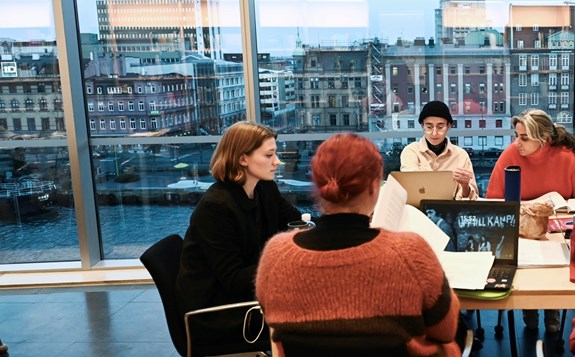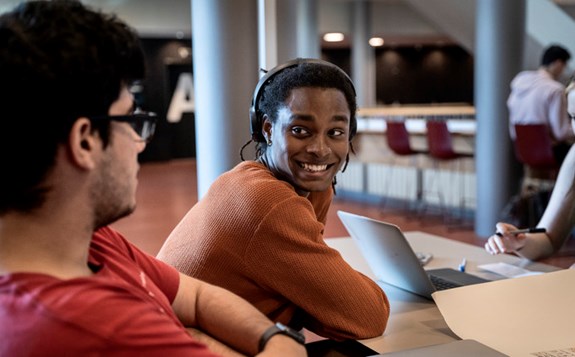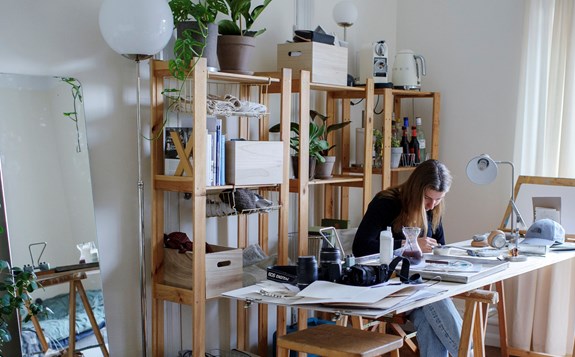We use cookies on this website. Cookies help us deliver the best experience on our website. Read about cookies.
-
- Education
- Education
- Programmes and courses
- Applications and admissions
- Tuition fees
- Scholarships
- Exchange studies at Malmö University
- Study Guidance
-
- After admission
- After admission
- Moving to Malmö
- Pre-orientation
- Arrival guide
-
- About studies at Malmö University
- About studies at Malmö University
- Why choose Malmö University
- Understanding university studies
- Connect with our students
On the page -
- Research
- Research
-
- Doctoral studies
- Doctoral studies
- Doctoral courses
-
- Doctoral schools
- Doctoral schools
- Adaptation of urban space through sustainable regeneration
- ComBine
- Culturally Empowering Education through Language and Literature
- Education, Learning and Globalisation
- Finding ways in a time of great future challenges (FinnFram)
- Swedish National Graduate School in Science and Technology Education Research
- Learning in Multicultural Societal Contexts
- Pedagogy and Vocational Skills
- Relevancing Mathematics and Science Education (RelMaS)
- Sustainable Movement Education
- The National Research School for Professionals in Social Services
- Research subjects
-
- Research centres
- Research centres
- Biofilms Research Centre for Biointerfaces
- Citizen Health
- Imagining and Co-Creating Futures
- Institute for Urban Research
- Malmö Institute for Migration Studies
- Literacy and Inclusive Teaching
- Centre for Work Life Studies
- Sustainable Digitalisation Research Centre
- Centre for Sexology and Sexuality Studies
-
- Research publications
- Research publications
- Search for research publications in Diva
- Malmö University Press
- Research events
- Participate in a research study
- Coffee Break Quiz
On the page -
- Collaboration and Innovation
- Collaboration and Innovation
-
- Levels of collaboration
- Levels of collaboration
-
- Local collaboration
- Local collaboration
- Muvah
- Regional collaboration
- National collaboration
-
- International collaboration
- International collaboration
- UNIC
- Innovation
- Collaboration with students
-
- Collaborate with researchers
- Collaborate with researchers
- Labs and facilities
- Culture collaboration
- Support Malmö University
- Alumni & Friends
On the page -
- About us
- About us
-
- Faculties and departments
- Faculties and departments
-
- Faculty of Culture and Society
- Faculty of Culture and Society
- Department of Global Political Studies
- School of Arts and Communication
- Department of Urban Studies
-
- Faculty of Education and Society
- Faculty of Education and Society
- Department of Childhood, Education and Society
- Department of Sports Sciences
- Department of Culture, Languages and Media
- Department of Natural Science, Mathematics and Society
- Department of Society, Culture and Identity
- Department of School Development and Leadership
- The Centre for Teaching and Learning (CAKL)
-
- Faculty of Technology and Society
- Faculty of Technology and Society
- Department of Computer Science and Media Technology
- Department of Materials Science and Applied Mathematics
- Faculty of Odontology
- University Dental Clinic
-
- Find and contact Malmö University
- Find and contact Malmö University
- Visit Malmö University
-
- News and press
- News and press
- Graphic manual
- Map of the buildings (Google Maps)
- Merchandise
- Supplier information and invoice management
- Whistleblowing
- We will help you with your questions
- Management and decision-making paths
-
- Malmö University's strategy 2030
- Malmö University's strategy 2030
- Sustainability
- Widened recruitment and participation
- Quality assurance work at the University
-
- Malmö Academic Choir and Orchestra
- Malmö Academic Choir and Orchestra
- Student work – video pieces
-
- Annual Academic Celebration
- Annual Academic Celebration
- Academic traditions
- Meet our new professors
- Meet our new doctors
- Honorary doctors
-
- The University in a troubled world
- The University in a troubled world
- Campus total defence
On the page
Social and behavioural science
behavioural science
Are you interested in political systems, societal changes and sustainability? Malmö University offers a wide range of bachelor's and master's programmes within social and behavioural sciences. Scholarships are available for international students. Applications are open until 15 January 2026.
Bachelor's programmes
-
Programme
 Programme, bachelor’s level | 180 credits
Programme, bachelor’s level | 180 creditsEuropean Studies - Politics, Societies and Cultures, Bachelor's Programme
31 August 2026 - 3 June 2029Malmö | daytime | 100%Open for application31 August 2026 - 3 June 2029Malmö | daytime | 100% -
Programme
 Programme, bachelor’s level | 180 credits
Programme, bachelor’s level | 180 creditsHuman Rights
31 August 2026 - 3 June 2029Malmö | daytime | 100%Open for application31 August 2026 - 3 June 2029Malmö | daytime | 100% -
Programme
 Programme, bachelor’s level | 180 credits
Programme, bachelor’s level | 180 creditsInternational Migration and Ethnic Relations
31 August 2026 - 3 June 2029Malmö | daytime | 100%Open for application31 August 2026 - 3 June 2029Malmö | daytime | 100% -
Programme
 Programme, bachelor’s level | 180 credits
Programme, bachelor’s level | 180 creditsInternational Relations
31 August 2026 - 3 June 2029Malmö | daytime | 100% -
Programme
 Programme, bachelor’s level | 180 credits
Programme, bachelor’s level | 180 creditsPeace and Conflict Studies
31 August 2026 - 3 June 2029Malmö | daytime | 100%Open for application31 August 2026 - 3 June 2029Malmö | daytime | 100%
Master's programmes
-
Programme
 Programme, master’s level | 60 credits
Programme, master’s level | 60 creditsCommunication for Development
31 August 2026 - 4 June 2028Distance | daytime | 50%31 August 2026 - 4 June 2028Distance | daytime | 50%Open for application -
Programme
 Programme, master’s level | 120 credits
Programme, master’s level | 120 creditsCriminology, Master's Programme (Two-Year)
31 August 2026 - 4 June 2028Malmö | daytime | 100% -
Programme
 Programme, master’s level | 120 credits
Programme, master’s level | 120 creditsEnglish and Education: Master's Programme (Two-Year)
31 August 2026 - 4 June 2028Malmö | daytime | 100% -
Programme
 Programme, master’s level | 60 credits
Programme, master’s level | 60 creditsInternational Migration and Ethnic Relations, Master's Programme (One-Year)
31 August 2026 - 6 June 2027Malmö | daytime | 100% -
Programme
 Programme, master’s level | 120 credits
Programme, master’s level | 120 creditsInternational Migration and Ethnic Relations, Master's Programme (Two-Year)
31 August 2026 - 4 June 2028Malmö | daytime | 100% -
Programme
 Programme, master’s level | 120 credits
Programme, master’s level | 120 creditsLeadership and Organisation: Societal Challenges and Organisational Changes, Master's Programme (Two-Year)
31 August 2026 - 4 June 2028Malmö | daytime | 100% -
Programme
 Programme, master’s level | 60 credits
Programme, master’s level | 60 creditsLeadership for Sustainability, Master's Programme (One-Year)
31 August 2026 - 6 June 2027Malmö | daytime | 100% -
Programme
 Programme, master’s level | 60 credits
Programme, master’s level | 60 creditsPolitical Science: Global Politics and Societal Change, Master's Programme (One-Year)
31 August 2026 - 6 June 2027Malmö | daytime | 100%Open for application31 August 2026 - 6 June 2027Malmö | daytime | 100% -
Programme
 Programme, master’s level | 120 credits
Programme, master’s level | 120 creditsPolitical Science: Global Politics, Master's Programme (Two-year)
31 August 2026 - 4 June 2028Malmö | daytime | 100%Open for application31 August 2026 - 4 June 2028Malmö | daytime | 100% -
Programme
 Programme, master’s level | 60 credits
Programme, master’s level | 60 creditsSport Sciences: Sport in Society, Master's Programme (One-Year)
31 August 2026 - 6 June 2027Malmö | daytime | 100% -
Programme
 Programme, master’s level | 120 credits
Programme, master’s level | 120 creditsSport Sciences: Sport in Society, Master's Programme (Two-Year)
31 August 2026 - 4 June 2028Malmö | daytime | 100% -
Programme
 Programme, master’s level | 120 credits
Programme, master’s level | 120 creditsUrban Studies, Master's Programme (Two-Year)
31 August 2026 - 4 June 2028Malmö | daytime | 100%Open for application31 August 2026 - 4 June 2028Malmö | daytime | 100% -
Programme
 Programme, master’s level | 120 credits
Programme, master’s level | 120 creditsUrban Studies: Urban Business and Development - Real Estate and Transport, Master's Programme (Two-year)
31 August 2026 - 4 June 2028Malmö | daytime | 100%Open for application31 August 2026 - 4 June 2028Malmö | daytime | 100%
How to apply
Apply no later than 15 January. Follow our step-by-step guide on how to apply.
Career
After completing a programme in social and behavioural science, future employers may be found in diplomatic service, local and national administrations, non-governmental organisations and international organisations. The bachelor's programmes provide a solid foundation for further master’s level studies.
The campus and the city of Malmö provide a global learning environment. You are geographically perfectly positioned to make Malmö your gateway to Europe and its international job market. Malmö is one of Sweden’s fastest-growing metropolitan centres and has a lively start-up scene for the entrepreneurially driven.
Newsletter for future students
Join the newsletter and get updates on application key dates, programmes, courses, and much more.
Testimonials
Criminology, master's programme
Criminology, master's programme
Master's student Sanjay talks about why he chose to study the master's programme in Criminology at Malmö University.
https://youtube.com/embed/jG4XbuzrBDs?enablejsapi=1&rel=0&showinfo=1&controls=1
International Migration and Ethnic Relations, master's programme
International Migration and Ethnic Relations, master's programme
Heléne explains what made her choose the IMER master´s programme and reflects on her experiences studying in an international programme at Malmö University.
Leadership for Sustainability, master's programme
Leadership for Sustainability, master's programme
Alumna Karolina talks about the master's programme and about her role as an impact coordinator for an international organisation.
https://youtube.com/embed/5kre4lYHZEI?enablejsapi=1&rel=0&showinfo=1&controls=1
Student testimonials
Urban Studies, master's programme
Urban Studies, master's programme
Adriana explains why she chose the urban Studies master's programme at Malmö University.
https://youtube.com/embed/yaCwWhJ8BVU?enablejsapi=1&rel=0&showinfo=1&controls=1
Urban Business and development, master's programme
Urban Business and development, master's programme
Master's students Arntit and Naa explain why they chose to study Urban Business and development at Malmö University.
https://youtube.com/embed/XdajtrAyurU?enablejsapi=1&rel=0&showinfo=1&controls=1
European Studies – Politics, Societies and Cultures, bachelor's programme
European Studies – Politics, Societies and Cultures, bachelor's programme
Lecturer and doctoral student Michel Anderlini, and student Johanna Weitekamp talk about the programme European studies.
https://youtube.com/embed/tIg9DwYu53Q?enablejsapi=1&rel=0&showinfo=1&controls=1

Human Rights, bachelor's programme
For Edoardo Iacobelli, studying human rights seemed to be a perfect way of making a profession out of his interest in international issues. When the time came to pick a bachelor’s programme, Malmö University seemed to be the perfect fit, located in a genuinely multicultural city.

Human Rights, bachelor's programme
For Edoardo Iacobelli, studying human rights seemed to be a perfect way of making a profession out of his interest in international issues. When the time came to pick a bachelor’s programme, Malmö University seemed to be the perfect fit, located in a genuinely multicultural city.
Seeing new perspectives
“Studying human rights is fascinating; we do get the full spectrum of it all. The political and legal, as well as the more philosophical perspectives. I have always been very interested in social change, and I want to work with something that has a demonstrable effect on people’s lives. This programme has opened doors for me to do that.”
“My ambition has always been to work with politics, and I wanted to study something versatile and substantial, and that’s why I chose this programme. Once I started, it was the legal aspect that caught my interest, and my goal now is to work with international law in combination with my degree in Human Rights. I find that this programme encourages us to work with different spheres within human rights, not just politics.”
Benefits of choosing Malmö
Studying human rights means you have to put in the hours, but it’s not all lectures and homework. One of the advantages of studying in Malmö is that you are very close to the issues at hand. Since moving here, Edoardo has become chairman of Amnesty’s Malmö section.
“Malmö is a big activist city and there are a lot of organisations to get involved with if you are passionate about human rights. It’s a great place to meet like-minded people interested in humanitarian issues who want to make a difference.”
The programme consists primarily of lectures, seminars and group work, all led by great teachers, says Edoardo.
“If I could give some advice to prospective students it would be to pick the brains of the teachers and soak up as much information as you can. The professors are great, and lecturers are never afraid to have discussions in class. You can tell it’s not just about one-way communication.“

International Migration and Ethnic Relations, bachelor's programme
Keenan Allen had many plans. Ending up in the IMER classroom was not one of them. Now, he wants to use his knowledge to be a social entrepreneur, an artist, a researcher, and much more. A few years ago, Keenan was studying medicine in Tokyo. Today, he is working with refugee children in Malmö...

International Migration and Ethnic Relations, bachelor's programme
Keenan Allen had many plans. Ending up in the IMER classroom was not one of them. Now, he wants to use his knowledge to be a social entrepreneur, an artist, a researcher, and much more. A few years ago, Keenan was studying medicine in Tokyo. Today, he is working with refugee children in Malmö. “When I started studying, I had my heart set on becoming a physician and spent years studying biology and medicine. I found myself overwhelmed and exhausted. I thought I could be more effective working with society rather than the human body.”
Studying at Malmö University
Originally from Chicago, Keenan moved to New Orleans just before hurricane Katrina hit and lead to widespread dislocation. By the time he moved to Sweden, he had seen the effects of migration and movement firsthand.
“When I came here I felt that I was ready to finish a degree. I found out about this programme and thought it would serve me very well. It has given me the basis for understanding how and why people move. We study migration theories, citizenship and how these issues relate to identity.
“The programme also focuses on ethnic relations, which wasn’t the most appealing part of the programme for me at the start. However, as I'm working in the field, I am realising that the more globalised we become through technology, the more we need to connect in a physical way, face-to-face.”
Working with unaccompanied refugee children
Since finishing his studies at Malmö University, Keenan has been working at a residential care home for unaccompanied refugee children in Malmö.
“In the programme we get to study refugee and asylum law and processes, all of the things I deal with at work. When assisting these people, I understand how the law works and how the EU has designed its framework. The programme is very practical in that sense.”
Passport Carriers
Even before moving to Sweden, Keenan was working on a personal project exploring borders and closed spaces.
“I remember that when I got my passport, that was the first time I started thinking about national identity, and how passports are directly connected to certain kinds of access. I started a project in Chicago called Passport Carriers.”
“The project is about mobility and how to include people who are excluded from society. Now, when working with young people, I want to continue my project to inspire them. My ambition is to turn this into a research project in the future.”
“I see myself as a cultural activist or cultural entrepreneur involved in social business. It is hard to explain because I want to bounce around and not be in a fixed position. I want to be able to utilise my knowledge in collaboration with others. I really believe in people and people’s capacity to do great things.”

International Relations, bachelor's programme
After graduating from the International Relations programme, Aleksandra Daynova chose to continue her studies with the goal of working with risk analysis. Today, she is pursuing a master’s in Security Risk Management at the University of Copenhagen while also doing an internship at a political...
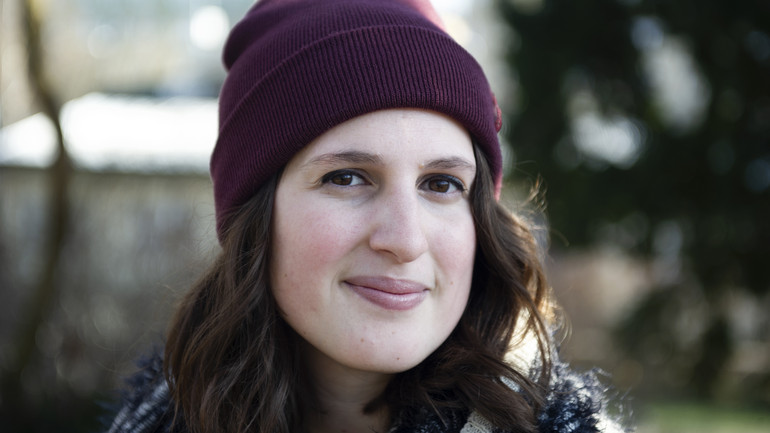
International Relations, bachelor's programme
After graduating from the International Relations programme, Aleksandra Daynova chose to continue her studies with the goal of working with risk analysis. Today, she is pursuing a master’s in Security Risk Management at the University of Copenhagen while also doing an internship at a political consultancy company. It was during her experience working as an au pair in Washington DC that Aleksandra got interested in politics and international affairs. Originally from Bulgaria, she moved to Sweden to study the International Relations bachelor’s programme.
How would you describe the programme?
It helped me gain a systemic understanding of world affairs. Firstly, on a theoretical level through learning about the major debates between scholars in a historical context; secondly, with the abundant discussions of empirical cases that helped us to place the theoretical debates into practical terms. The programme also gave me skills in terms of learning how to ask the right research questions, how to conduct research, and how to write at an academic level.
The programme was also great preparation for my master's studies. I utilise my knowledge of theories and empirical cases from most of my bachelor’s classes, especially from my classes in Security Studies and in-depth studies in Global Politics.
Learning how to conduct research in an effective and time-sensitive way is useful to me on a day-to-day basis in my position as a junior advisor. In my work, I need to be ready to provide research and analyses of various political topics, which my background knowledge from IR enables me to do.
What did you like most about the programme?
What I liked most was the depth of knowledge about world politics it provided me with. I especially liked the critical theoretical approaches to teaching International Relations, with an emphasis on feminist, environmental, and postcolonial theories. I also really appreciated all the practical aspects of the programme such as doing EU negotiation simulations and the opportunity to participate in the Model NATO summit.
What was your impression of Malmö University?
I had a great experience at Malmö University! I really enjoyed how many other international students there were. I found that there were many opportunities to meet people with similar interests at events such as the ones organised by the Student Association of Foreign Affairs. The library and Niagara buildings are also beautiful places to study in, with a view of the sea and the Turning Torso.
What are your plans for the future?
I am aiming to work as an analyst advising companies on either sustainability or technology risks, as those are the two aspects of risk management that I find the most timely and interesting. My goal is to advise in the context of compliance with EU and global regulations, as well as general ways to be more resilient as an organisation in the face of technological disruption and environmental crises.
Do you have any advice for someone who is looking to apply to the programme?
If you are already glued to world news and are curious about history in general, this programme is a great way to put those interests into a potential career path.
Don’t worry too much about being perfect at academic writing right away — it comes with a lot of practice and constructive feedback. I wish someone had told me that, it would have saved me some stressful evenings!
Study groups are the best, both for learning how to give and receive feedback, and for fika (coffee and pastry) breaks!

Peace and Conflict Studies, bachelor's programme
Yannick Deller got the opportunity to study five different courses in Hong Kong during his exchange semester. Now, he recommends anyone who wishes to learn more to take the chance.
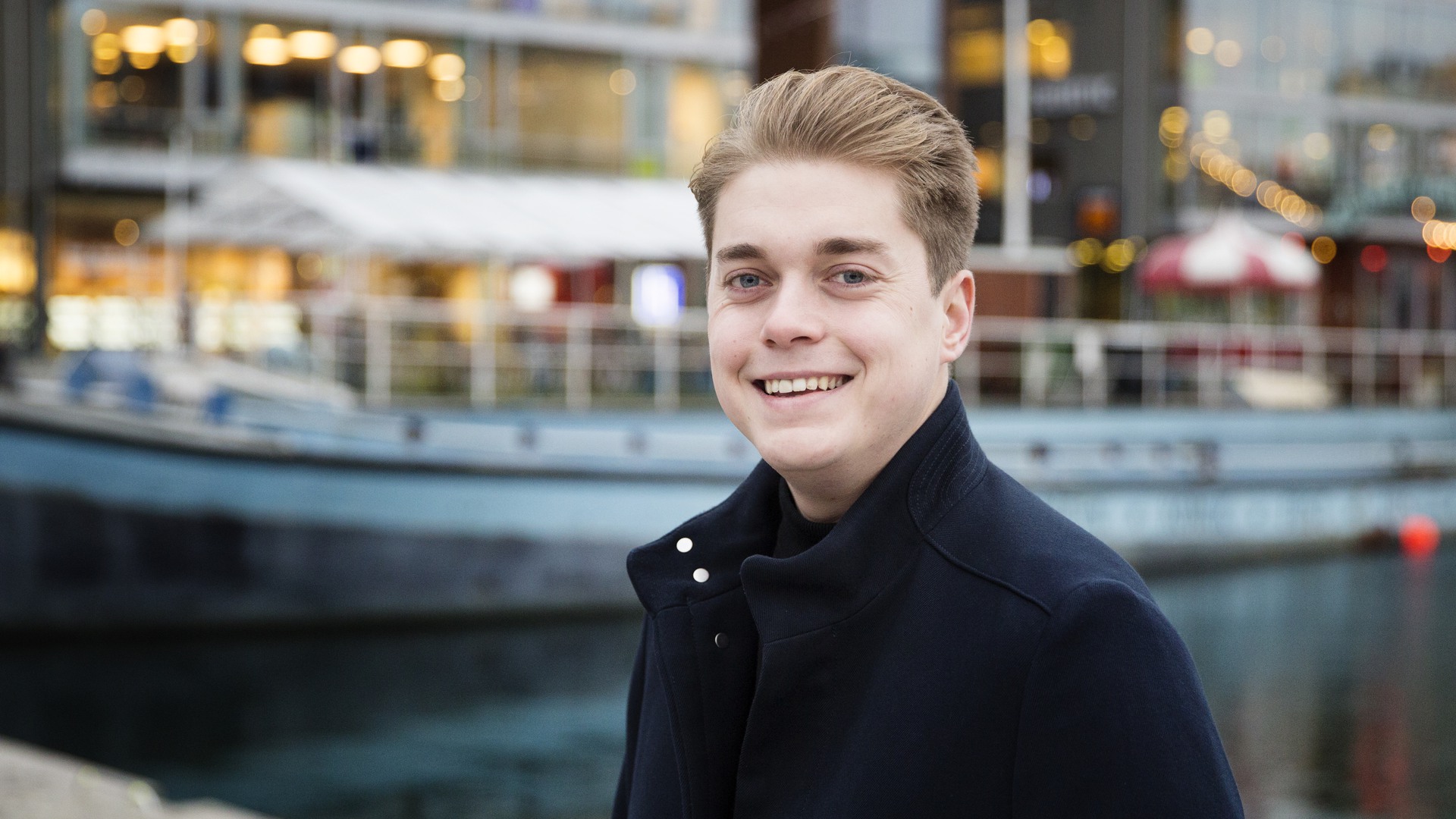
Peace and Conflict Studies, bachelor's programme
Yannick Deller got the opportunity to study five different courses in Hong Kong during his exchange semester. Now, he recommends anyone who wishes to learn more to take the chance.
What did you enjoy most about the programme?
"Through Peace and Conflict Studies I was given the opportunity to develop my own critical thinking and question certain dominant beliefs as well as value systems. It was truly an eye-opener in this sense. The programme is broad and offers many different attempts at explaining certain social, cultural, and economic conflicts. Due to the international and multicultural nature of the programme, it also offered me the chance to discuss all these issues with people from all over the world."
When you studied abroad, where did you go and what did you learn?
"I went on exchange to Hong Kong and took five different courses there. Overall, I would say I developed an understanding of different cultural, societal and political viewpoints on everyday challenges people face. Through meeting and interacting with local students, I gained a more thorough understanding of the very unique culture of Hong Kong. I highly recommend that anyone who wishes to learn more go on exchange!"
Who would you recommend this programme to?
"I think this is a programme for everyone who is not satisfied with the 'status quo' or anyone who wants to make the world a better place than it was yesterday. My point is not that this programme will give you a definitive answer or solution for this endeavour but it will teach you how to think about these issues. Not to say that it will teach you a certain way of thinking, but rather that it will teach you to question your thinking. It will broaden your way of perceiving problems, solutions, and individual experiences."
Do you have any advice for someone who is looking to apply to the programme?
"Be aware of the workload, it is going to be a lot. You will be doing a considerable amount of reading and researching, but it’s worth it. Also, be aware that this programme has some emotionally heavy readings and witness accounts of violence. It can sometimes be difficult to process such information, hence study groups and friends are a good way of sharing and negotiating these experiences. Finally, if your native language is not English, don’t worry about it! You will get used to it and it’s a pretty great way of developing your language skills."
What do you want to work with in the future?
"Right now, my current plan is to pursue an academic career. I love research and teaching. I like to think about knowledge as a product of human interaction, and I believe that an academic career will allow me to learn more about the world through the interaction with other people, be it by researching a certain topic or teaching students."

Leadership and Organisation, master's programme
Julia Breidenstein moved from Germany to study the master’s programme Leadership and Organisation: Societal Challenges and Organisational Changes. Right after her graduation, she started at her current job at Accelerated Growth in Malmö. "Before I decided to study in Sweden, I did my bachelor’s...
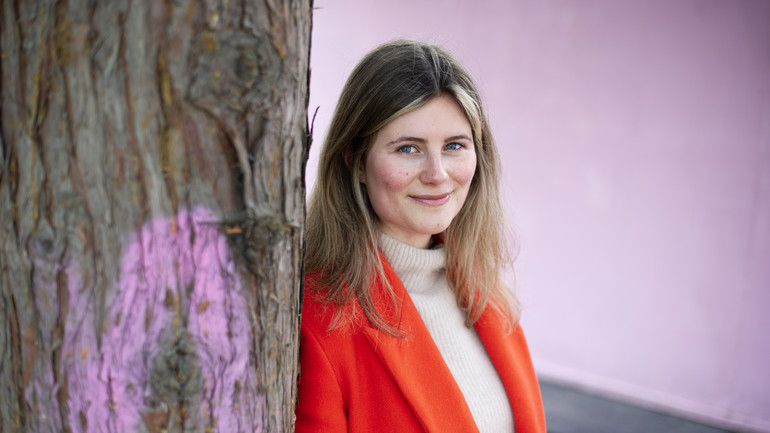
Leadership and Organisation, master's programme
Julia Breidenstein moved from Germany to study the master’s programme Leadership and Organisation: Societal Challenges and Organisational Changes. Right after her graduation, she started at her current job at Accelerated Growth in Malmö. "Before I decided to study in Sweden, I did my bachelor’s degree in International Business with a focus on change management. I then worked as a sales district manager for a German food retail company. After a while, I felt the desire to educate myself further. " "My choice landed on Leadership and Organisation because I wanted to deepen my understanding of the intertwined social and organisational dynamics of the drivers and impacts of societal challenges. I also found the programme interesting because of its interdisciplinary character."
New perspectives and problem-solving
"The programme gives you an understanding of and new perspectives on the challenges of today and discusses approaches and methodologies to solve them. One key finding for me was that in order to take action and create change, the first step is to get a profound understanding of the actual problem."
"During the third semester, you have the opportunity to choose elective courses. I enjoyed the course on climate change during the first semester. It was relevant and informative since the climate crisis is one of our biggest challenges. I found it very interesting and wanted to deepen my knowledge further. The elective semester allowed me to choose a sustainability course to learn more and gain informed and critical perspectives on this relevant topic."
"Being a student in an international programme was both beneficial and fun. We always had a lot of interesting discussions. It adds a lot of value and diversity to the programme when you get the possibility to understand different viewpoints."
A job where you create change
"Today, I work as a roll-out coordinator at a smaller consultancy called Accelerated Growth in Malmö, where I started right after my graduation."
"My role is to be involved in projects where changes are implemented in clients' organisations. The current project aims to improve the visibility and end-to-end traceability of food products. Stakeholder management and change communication are a big part of my work since the changes affect many employees. I get to apply critical thinking and use a creative approach, which I gained from the programme. It has been an exciting journey. "
Malmö University
Malmö University is a young, urban and innovative university located in the southernmost region of Sweden. The University has around 24,000 full-time students, and campuses with a global learning environment. The University’s research profile is characterised by global engagement, community involvement, and a multidisciplinary and challenge-based approach.
Malmö is a vibrant city with a young and diverse population of 350,000. It is an extremely bike-friendly city. Located in the Öresund region, Malmö lies just a short train journey from the Danish capital city, Copenhagen. The region is home to about four million people and offers a buoyant job market with great international career opportunities.

